Related Research Articles

Fredrik Natanael Beskow was a Swedish theologian and school headmaster. He was also active as a preacher, writer, artist, pacifist and social activist. Beskow published a number of collections of sermons. He also made substantial contributions as a hymn writer.
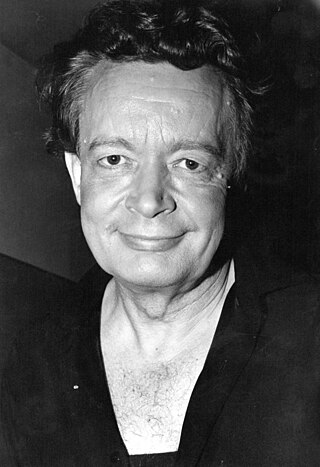
Ernst-Hugo Alfred Järegård was a Swedish actor.

Sigtuna is a locality situated in Sigtuna Municipality, Stockholm County, Sweden with 8,444 inhabitants in 2010. It is the namesake of the municipality even though the seat is in Märsta. Sigtuna is for historical reasons often still referred to as a stad.
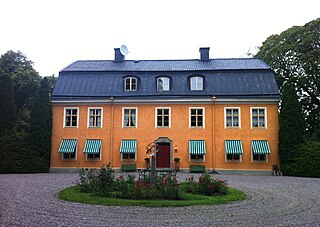
Signhildsberg is a manor that formerly was a royal estate, located in the parish of Håtuna approximately 4 kilometres (2.5 mi) west of the modern town of Sigtuna, by Lake Mälaren in Sweden. Although the location is nearly forgotten, it has a central role in Norse mythology, according to which it was founded by the Norse god Odin.

Sven-Bertil Gunnar Evert Taube was a Swedish singer and actor. Internationally, he was perhaps better known for his acting career. Taube played Henrik Vanger in the film The Girl with the Dragon Tattoo, and the lead role in Puppet on a Chain.
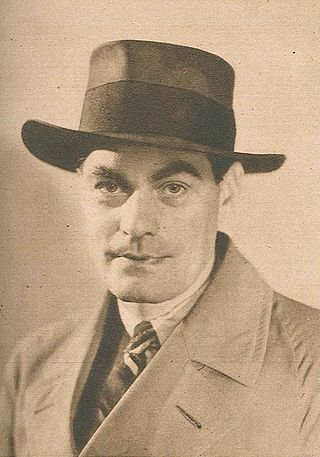
Jan Fridegård, born Johan Fridolf "Fride" Johansson, was a Swedish writer of the proletarian school. Fridegård wrote a trilogy of novels about the Viking Era in Sweden : Trägudars land, Gryningsfolket and Offerrök.
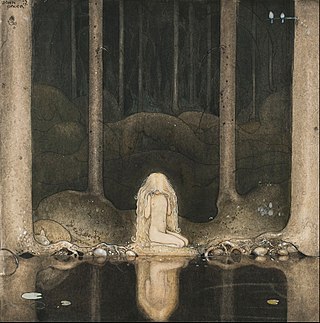
Among Gnomes and Trolls, is a popular Swedish folklore and fairy tales annual and children's fairy tale anthology published since 1907. One of the most noted of the early illustrators is artist John Bauer.

Ljugarn is a locality on the Swedish island of Gotland, with 200 inhabitants in 2014. It is located at the east coast of the island in Ardre south of Slite. It is regarded as a popular and quiet area as well as holiday village for tourists and vacationers. Ljugarn is the oldest seaside resort in Gotland, and was formerly a port, fishing village, pilot station and the county seat of Ljugarn County. The 1.5 km (0.93 mi) long flat sandy beach, one of the longest in Gotland, is visited throughout the year. Since the early 20th century the village has had pensions, restaurants, hostels, coffee-shops and a grocery store.
There are remarkably few Bible translations into Swedish that have been made before the last two centuries. The Latin common Bible is known to have been used by the Catholic Church during the Christian part of the middle ages, but at least paraphrases in Swedish of some parts of the Bible were made at the time. However, no complete translation has been preserved, and the earliest, certainly known, complete Bible was not made until the Reformation, on commission by Gustav Vasa.

Kerstin Kristina Birgitta "Kim" Anderzon was a Swedish actress active in film and theatre.
Hjalmar Sundén (1908–1993) was a Swedish psychologist, known for his contributions to the psychology of religion and for his development of "role theory".

Carl Olof Rosenius was a Swedish lay preacher, author and editor of the monthly Pietisten from 1842 to 1868. He was one of the country's most widely-heard preachers of his day and has been described as being of "extraordinary importance for the low-church evangelical revival not only in Sweden but also in the other Nordic countries".

Eric Göran Graffman was a Swedish actor and film director from Gothenburg). He was the father of the actor Per Graffman, the director Emil Graffman and Mats Graffman.
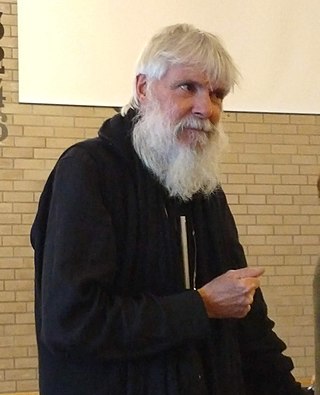
Peter Halldorf is a Swedish Pentecostal pastor, self-taught theologian, and writer. He is known for exploring Patristics, particularly the Desert Fathers, within a Pentecostal context. His interest has led him to be dubbed "The Pentecostal Monk" and sometimes prays in Coptic monasteries. He is a third-generation Pentecostal preacher who became interested in the Desert Fathers out of concerns Pentecostalism could fall into worldliness or shallowness. He also found an ultimate "gentleness" in much of the Desert Fathers' stories. Halldorf has both written about and been influenced by the Flodberg Circle, an early 20th-century Swedish circle of people interested in mysticism.
"Bereden väg för Herran" is a Christian hymn with lyrics by Frans Michael Franzén in 1812. Britt G. Hallqvist later rewrote the final verse lyrics. Describing Jesus coming into Jerusalem, it is a popular Advent song.

Esaias Tegnér Jr. was a Swedish linguist. He was professor of eastern languages at Lund University 1879-1908, lead editor of Svenska Akademiens ordbok 1913-1919, member of the Bible Commission 1884-1917, and member of the Swedish Academy from 1882 onward. Tegnér was the grandson of the well-known poet Esaias Tegnér, also his namesake, and was brother-in-law to the poet and composer Alice Tegnér.

The Committee on the Constitution (KU) is a parliamentary committee in the Swedish Riksdag. The committee's responsibilities include examining issues relating to the Swedish Constitution and Administrative laws, as well as examining the Prime Minister's performance of duties and the handling of government matters. The committee's activities are regulated by the Riksdag.
Agatha Rosenius was a Swedish hymnwriter.
The Swedish Holiness Union was a Swedish free church denomination from 1887 to 1994.
References
Notes
- ↑ Bogdan, Henrik; Hammer, Olav, eds. (2016). "Christian Theosophy in Sweden". Western Esotericism in Scandinavia. Leiden: Brill. pp. 142–143. ISBN 9789004302419.
- ↑ Halldorf, Joel (2012). Av denna världen? Emil Gustafson, moderniteten och den evangelikala väckelsen. Skrifter utgivna av Svenska Kyrkohistoriska Föreningen 2 (in Swedish). Skellefteå: Artos. p. 217. ISBN 978-91-7580-594-8.
- 1 2 3 "Hjalmar Ekström". Sigtuna Stiftelsen (in Swedish). Archived from the original on 2010-08-19. Retrieved 2023-05-25.
- ↑ Tägt, Nils (1996). David Petander – en svensk Franciskus: en bok om exemplets makt (in Swedish). Visby: Guteböcker. ISBN 9789187524325.
- 1 2 Ekström, Maja (Fall 2014). En ton från himmelen: En studie om Linnea Hofgren och mystikernas modersmål (Thesis) (in Swedish). Lund University.
- ↑ Halldorf, Peter (1997). Hädanefter blir vägen väglös (in Swedish). Göteborg: Pilgrim. p. 37. ISBN 9789186082567.
- 1 2 3 Ekström, Maja (Spring 2016). Tystnadens lovsång (Thesis) (in Swedish). Lund University.
Sources
- Schager, Henrik (1987). "En annan väg än den, där många gå": mystikern Henrik Schagers levnadsminnen (in Swedish). Delsbo: Åsak. ISBN 9789178300310.
- Ljungman, Ulrika (1983). Gud - och intet mer (in Swedish). Artos & Norma Bokförlag. ISBN 9789175800219.
- Lönnebo, Martin (1993). Religionens fem språk: om religionens mening och förnyelse (in Swedish) (2nd ed.). Stockholm: Verbum. ISBN 9789152621387.
- Geels, Anton (2015). Det fördolda livet: mystikern Hjalmar Ekström (1885–1962) – liv och lära (in Swedish) (2nd ed.). Skellefteå: Artos. ISBN 9789175807546.